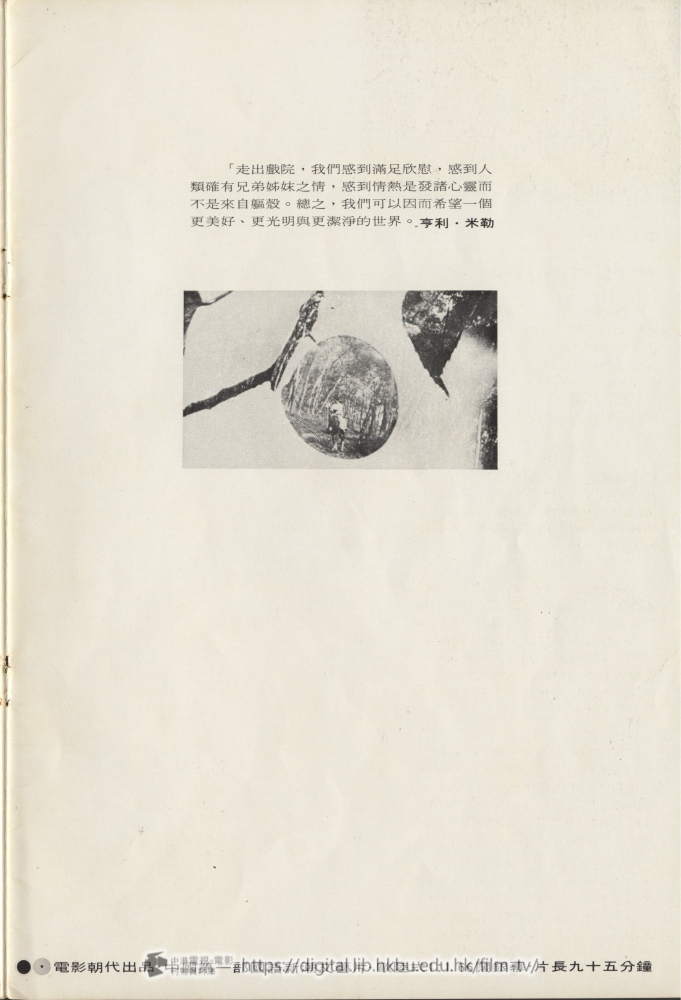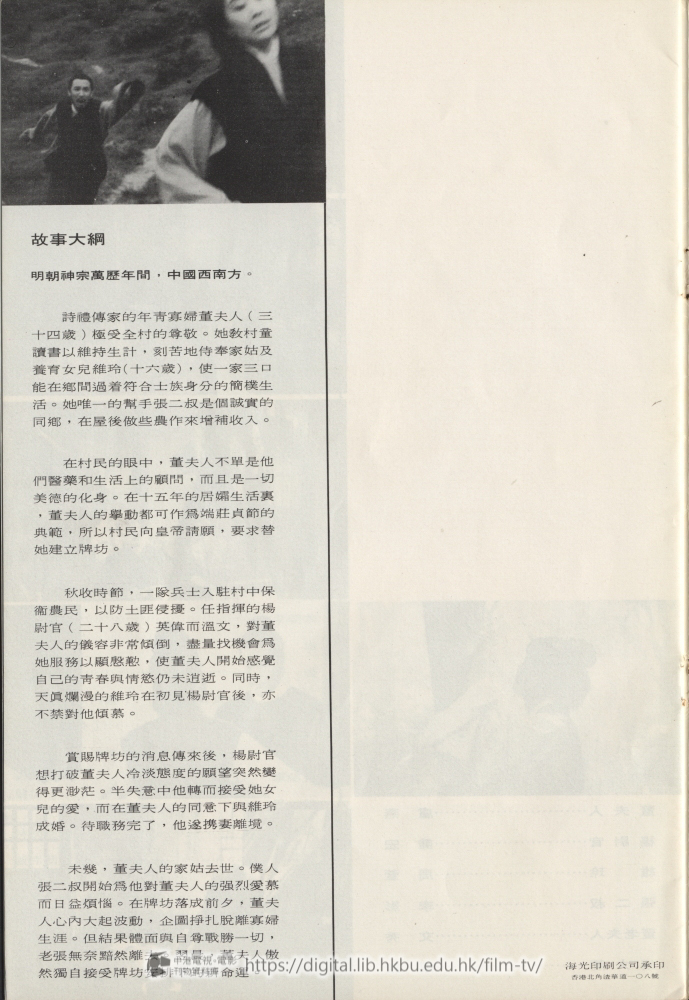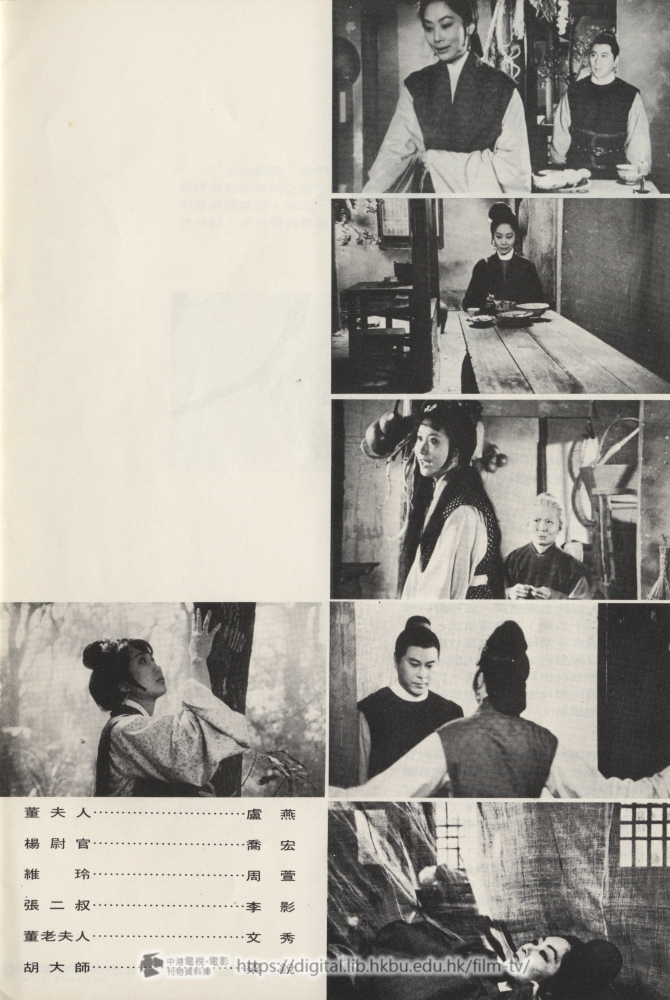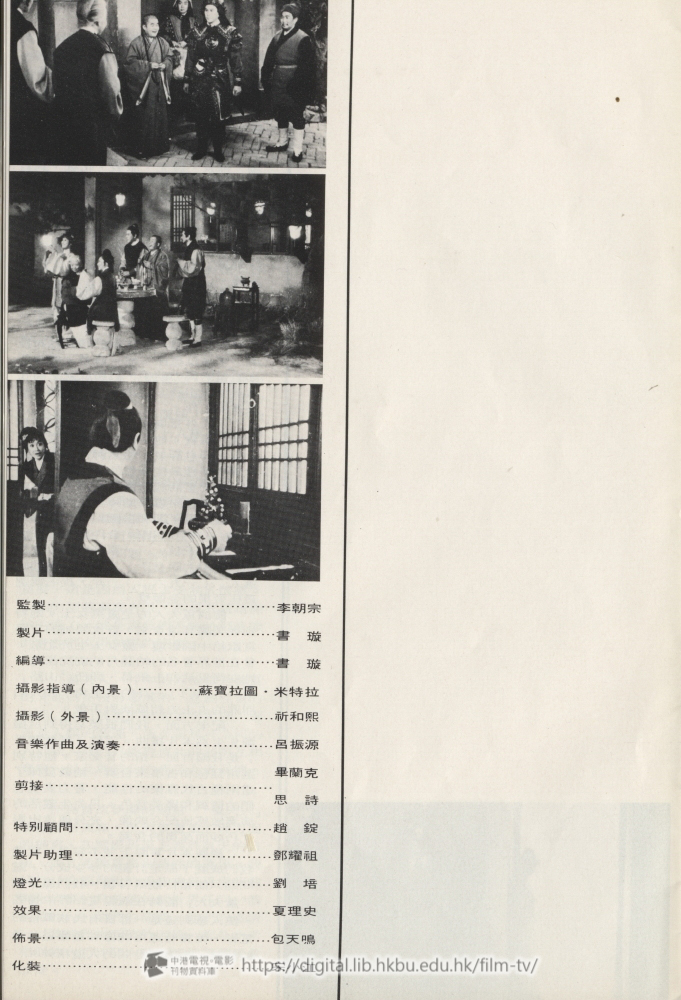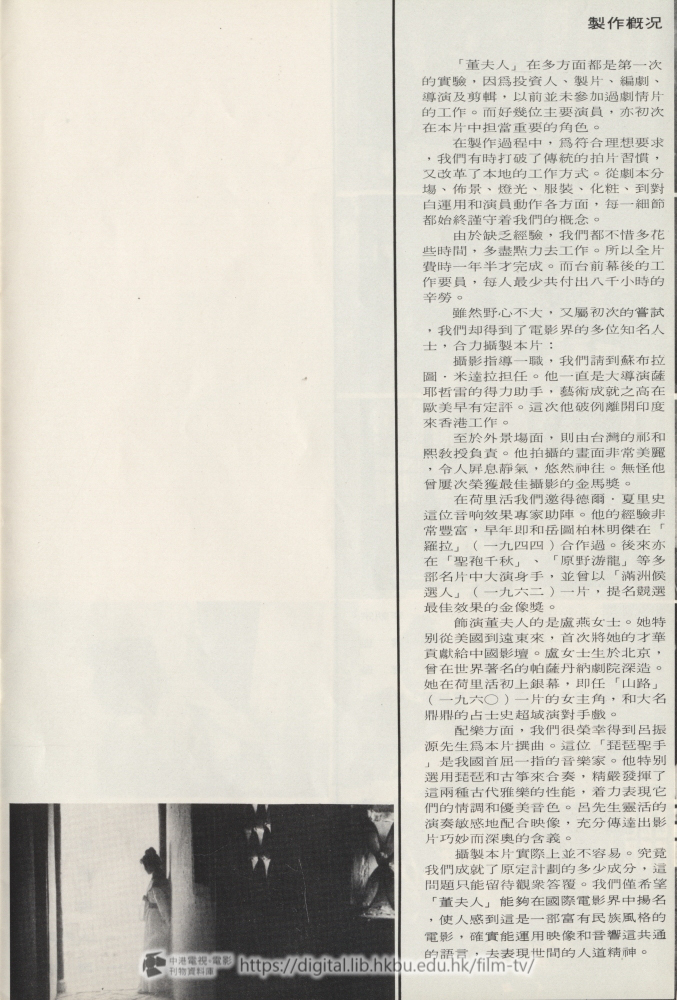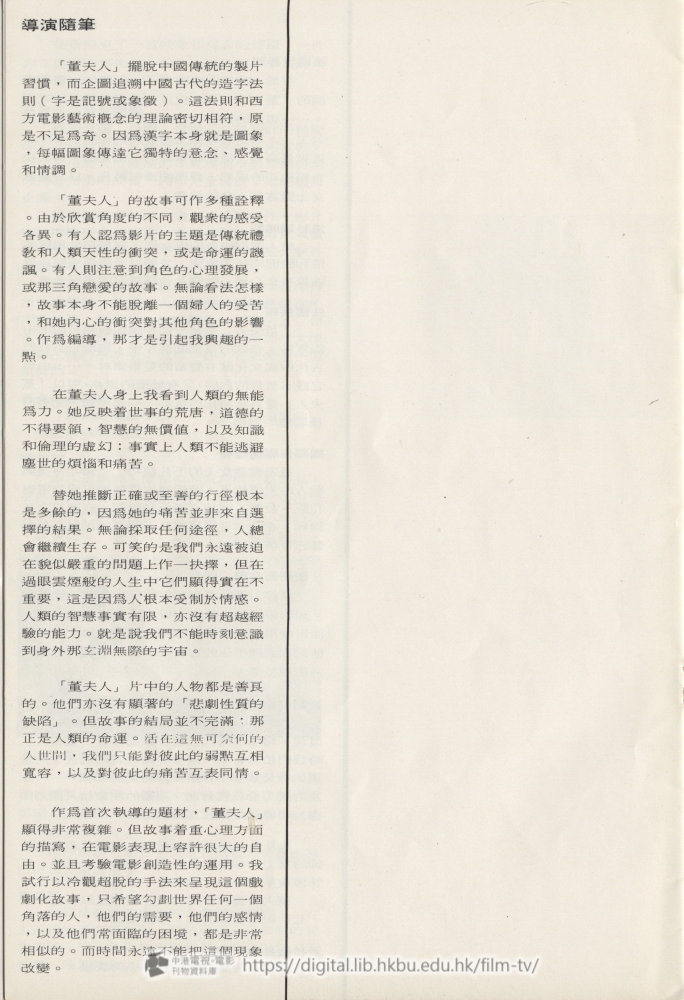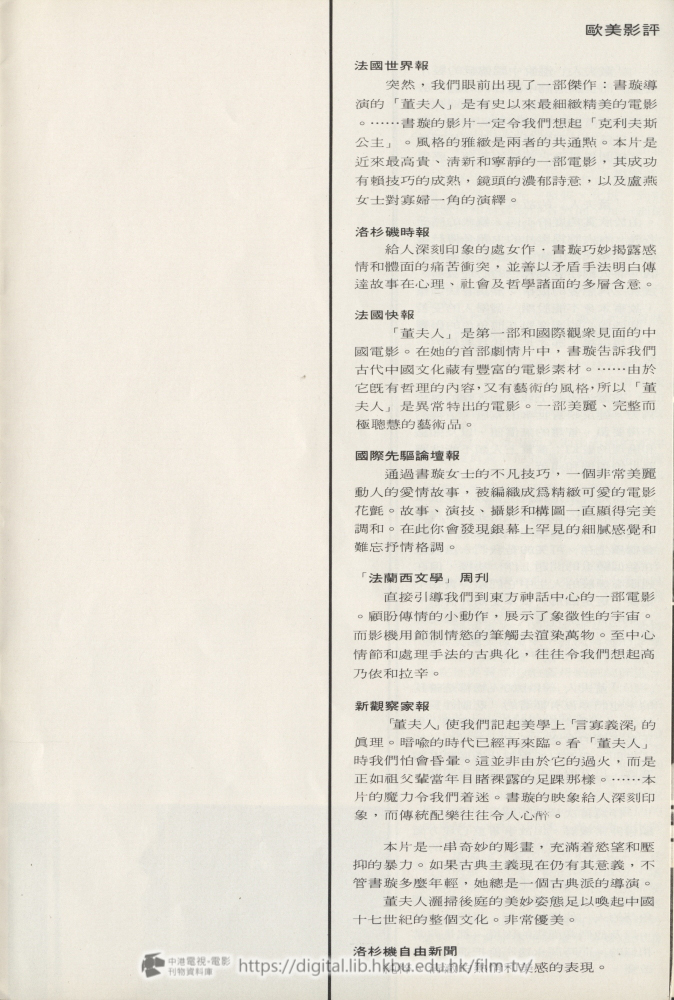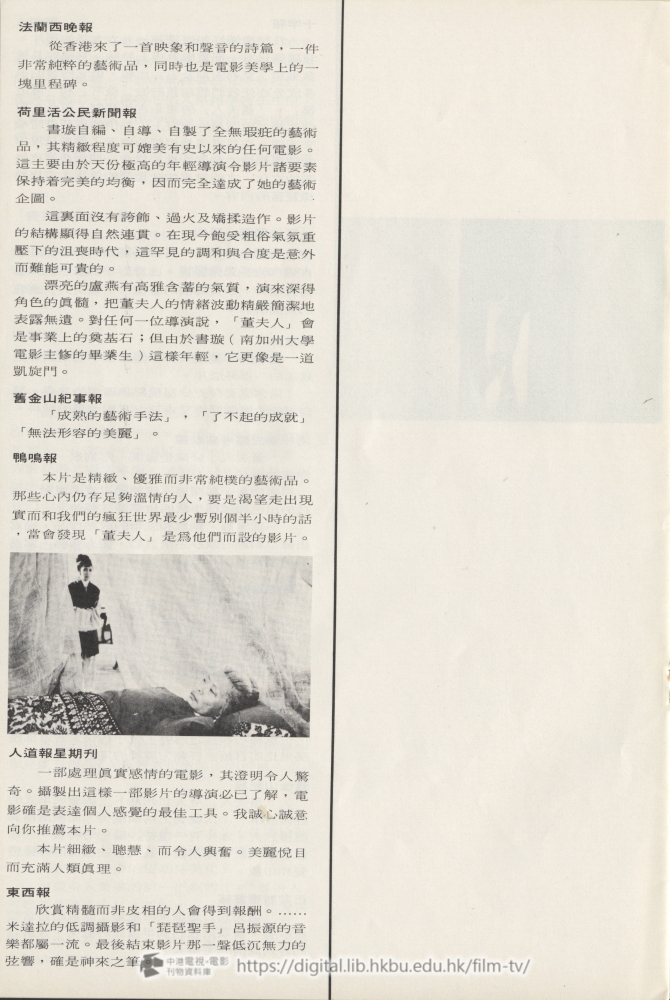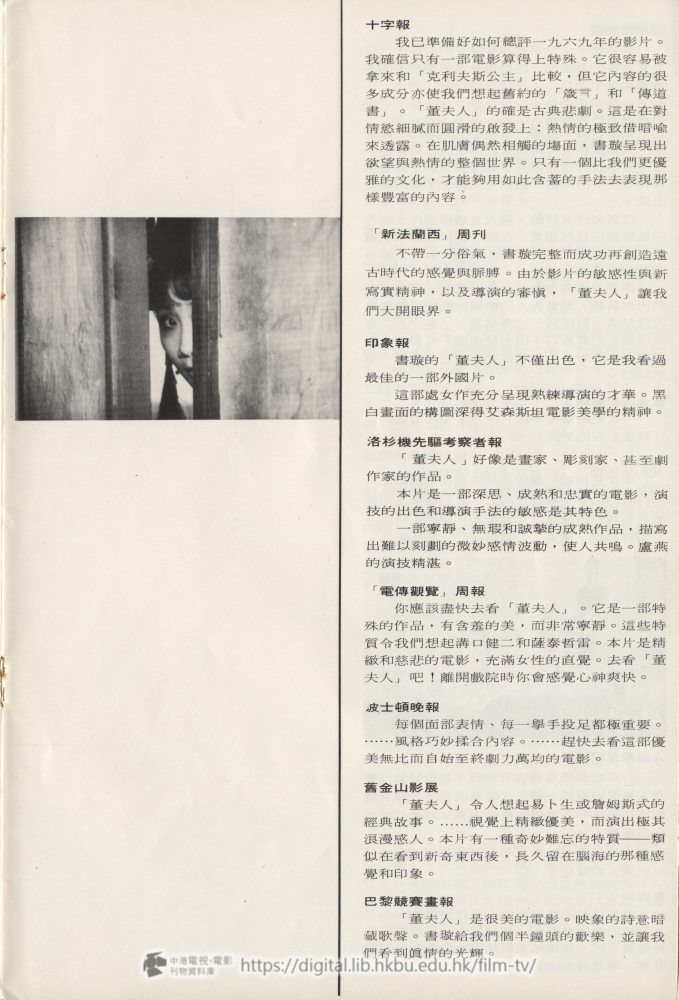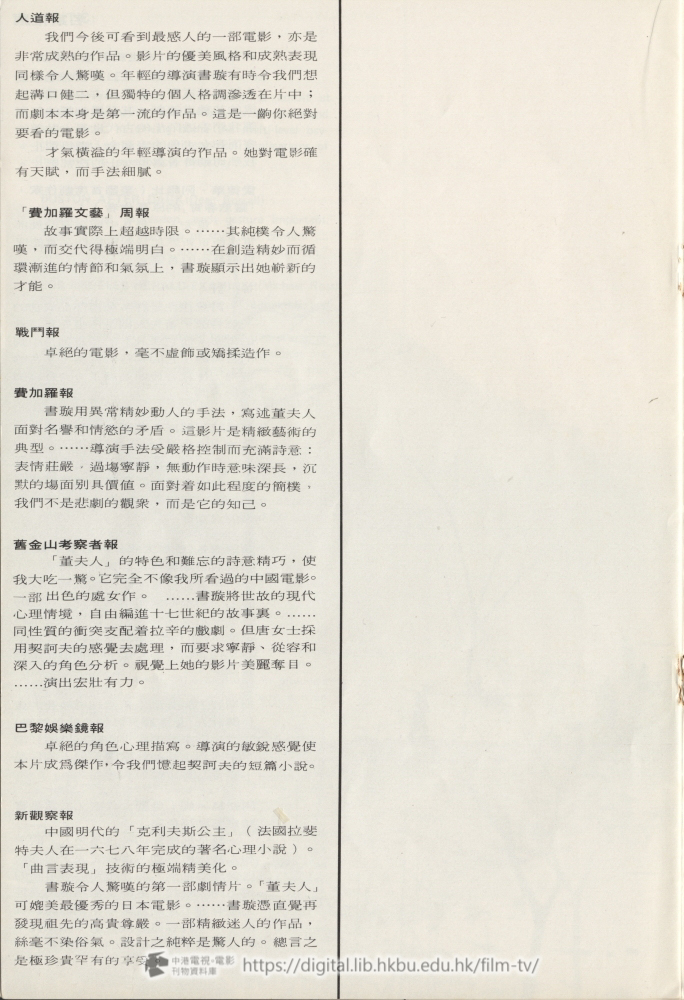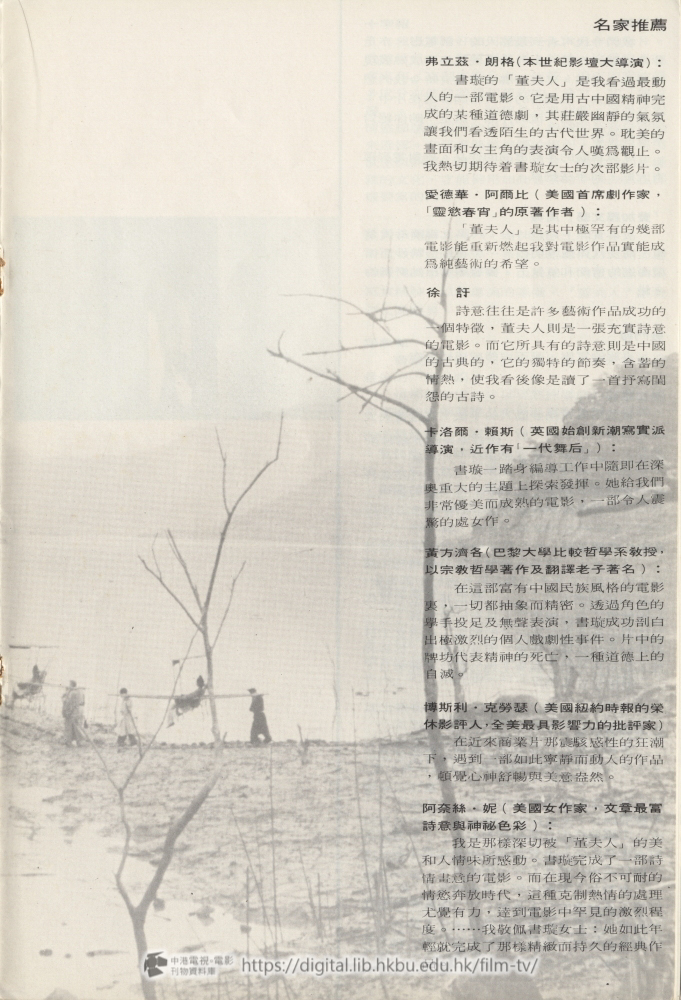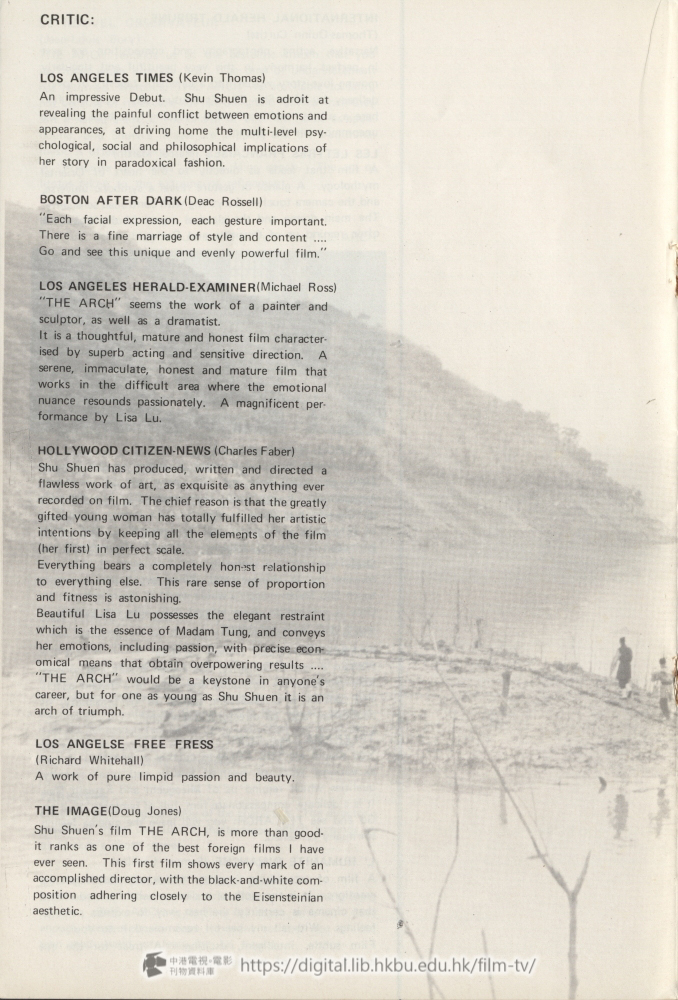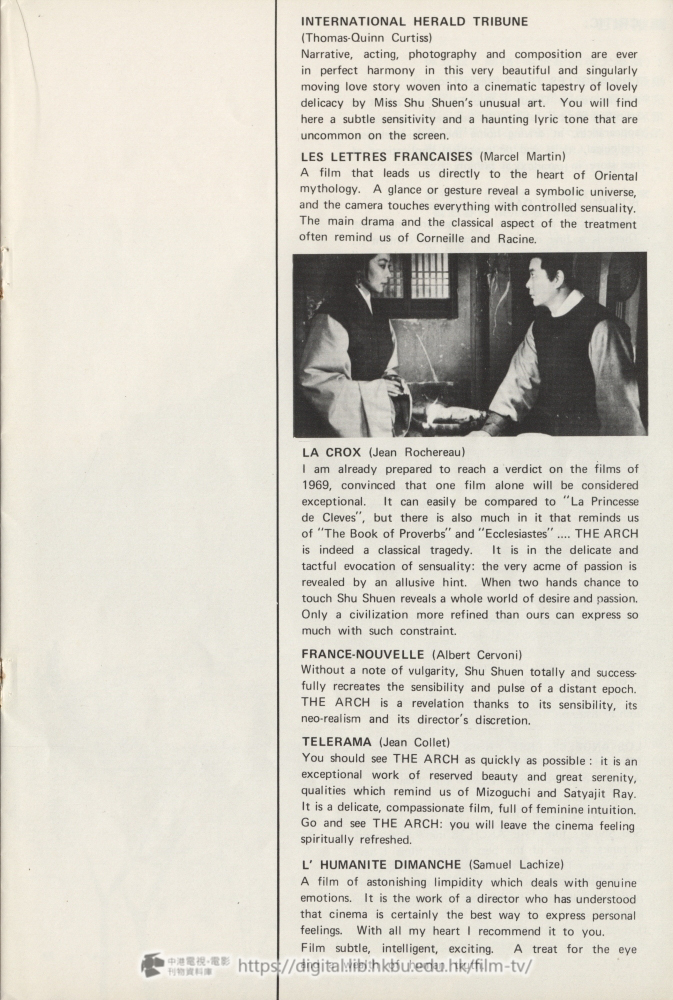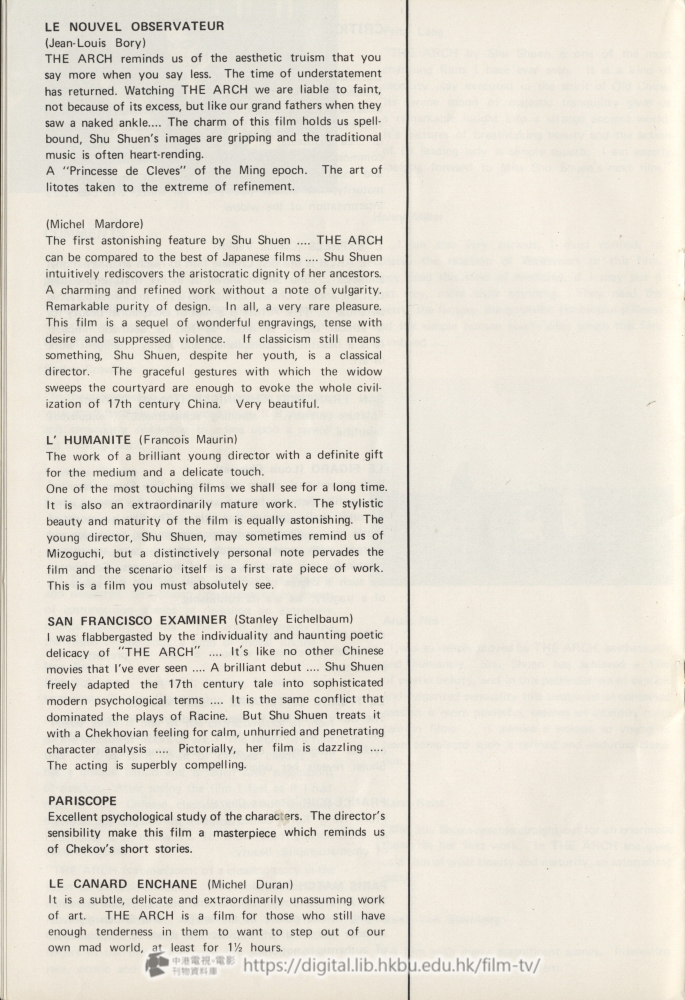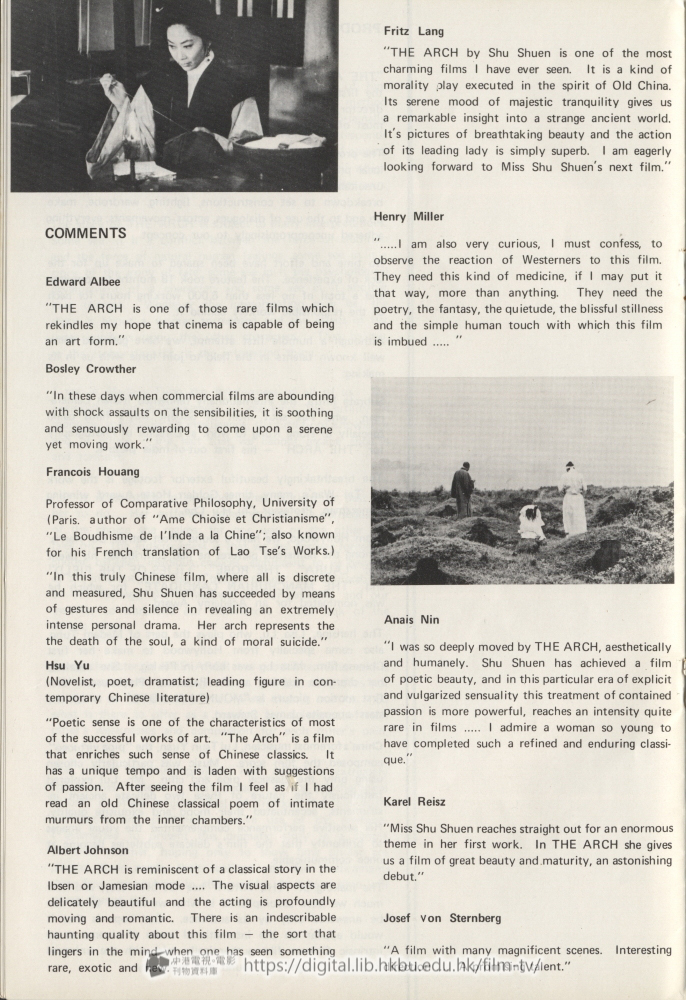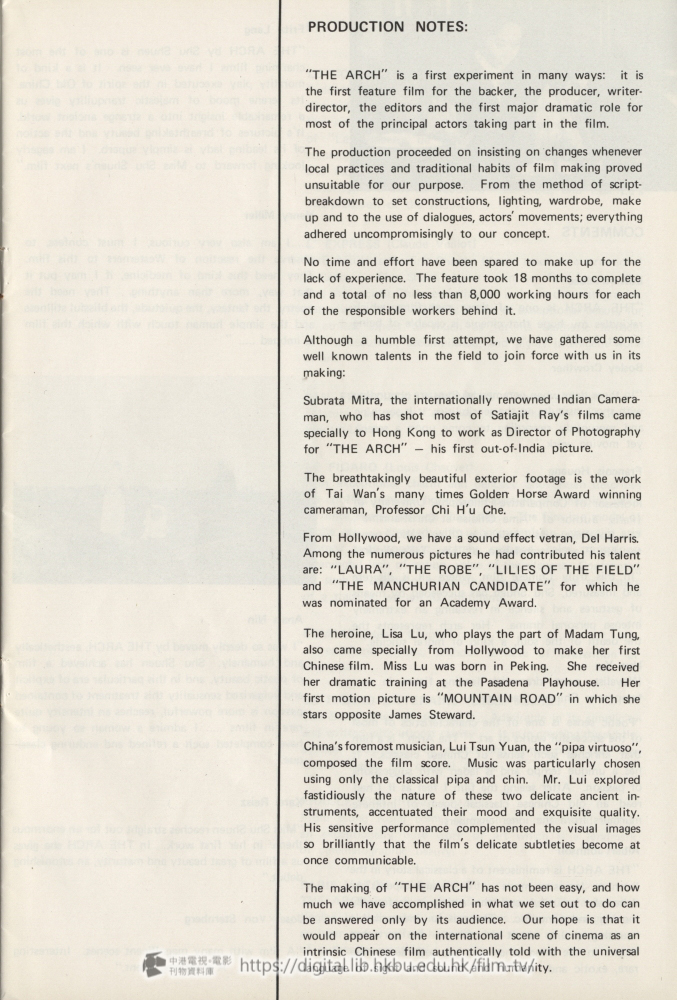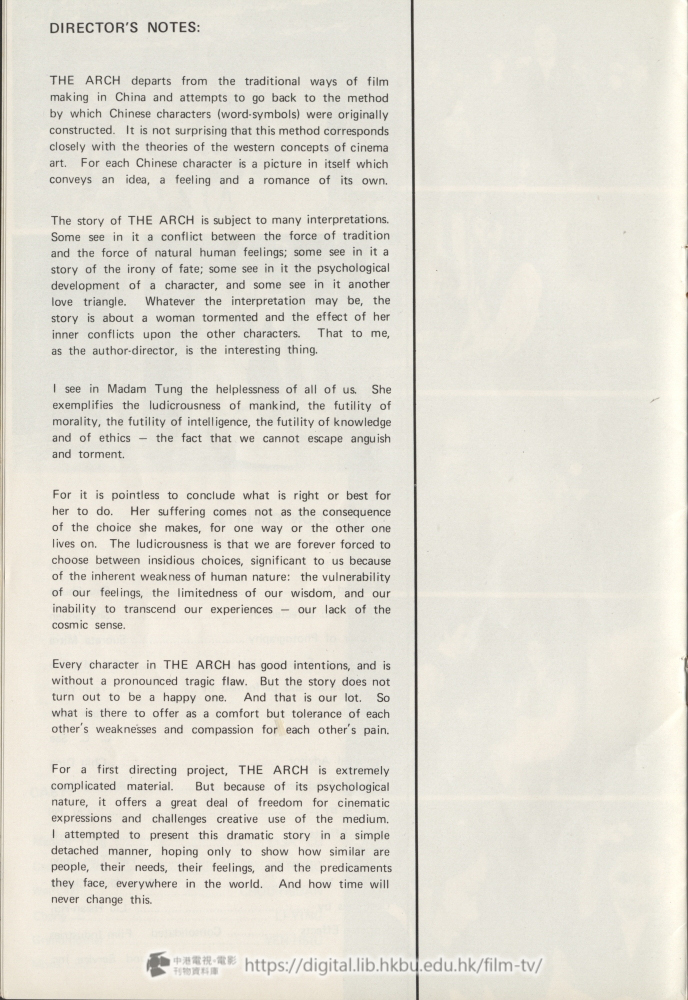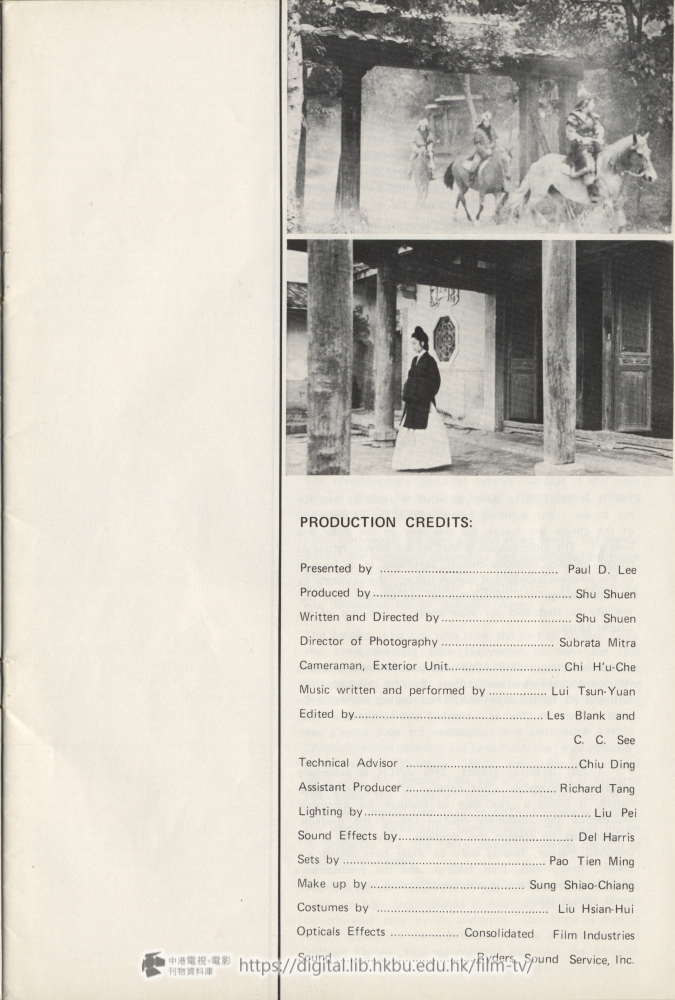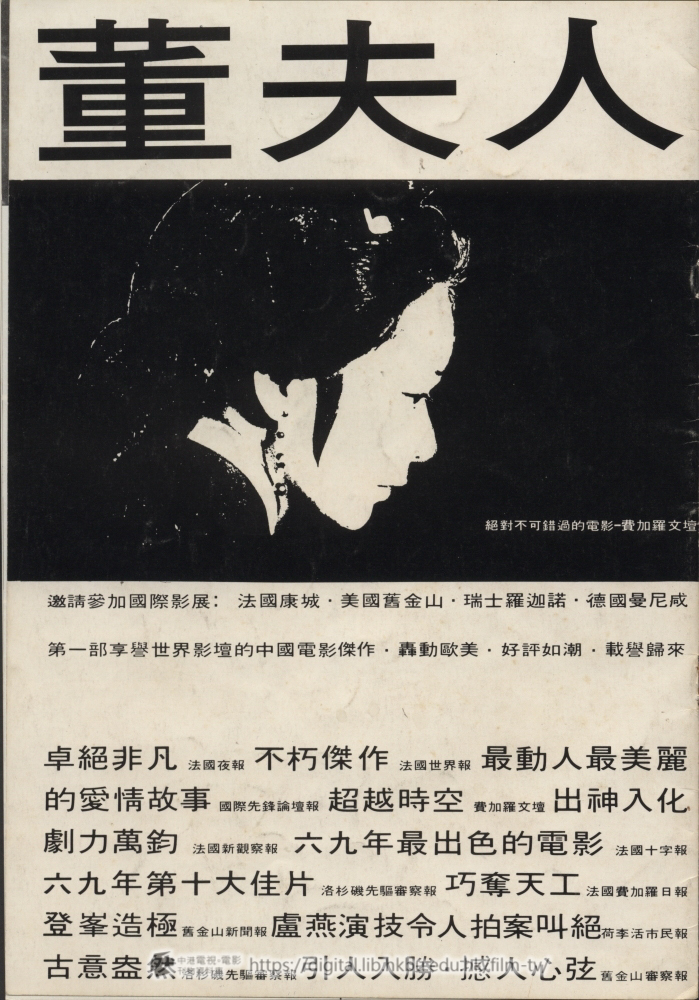
董夫人
邀請參加國際影展:法國康城.美國舊金山.瑞士羅迦諾.德國曼尼咸
第一部享譽世界影壇的中國電影傑作.轟動歐美.好評如潮.載譽歸來
卓絕非凡 法國夜報
不朽傑作 法國世界報
最動人最美麗的愛情故事 國際先鋒論壇報
超越時空 費加羅文壇
出神入化劇力萬鈞 法國新觀察報
六九年最出色的電影 法國十字報
六九年第十大佳片 洛杉磯先驅審察報
巧奪天工 法國費加羅日報
登峯造極 舊金山新聞報
盧燕演技令人拍案叫絕 荷李活市民報
古意盎然 洛杉磯先驅審察報
引人入勝・撼人心弦 舊金山審察報
「走出戲院,我們感到滿足欣慰,感到人類確有兄弟姊妹之情,感到情熱是發諸心靈而不是來自軀殼。總之,我們可以因而希望一個更美好、更光明與更潔淨的世界。亨利.米勒
故事大綱
明朝神宗萬歷年間,中國西南方。
詩禮傳家的年靑寡婦董夫人(三十四歲)極受全村的尊敬。她敎村童讀書以維持生計,刻苦地侍奉家姑及養育女兒維玲(十六歲),使一家三口能在鄉間過着符合士族身分的簡樸生活。她唯一的幫手張二叔是個誠實的同鄉,在屋後做些農作來增補收入。
在村民的眼中,董夫人不單是他們醫藥和生活上的顧問,而且是一切美德的化身。在十五年的居孀生活裏,董夫人的擧動都可作爲端莊貞節的典範,所以村民向皇帝請願,要求替她建立牌坊。
秋收時節,一隊兵士入駐村中保衞農民,以防土匪侵擾。任指揮的楊尉官(二十八歲)英偉而溫文,對董夫人的儀容非常傾倒,盡量找機會爲她服務以顯慇懃,使董夫人開始感覺自己的靑春與情慾仍未逍逝。同時,天眞爛漫的維玲在初見楊尉官後,亦不禁對他傾慕。
賞賜牌坊的消息傳來後,楊尉官想打破董夫人冷淡態度的願望突然變得更渺茫。半失意中他轉而接受她女兒的愛,而在董夫人的同意下與維玲成婚。待職務完了,他遂携妻離境。
未幾,董夫人的家姑去世。僕人張二叔開始爲他對董夫人的强烈愛慕而曰益煩惱。在牌坊落成前夕,董夫人心內大起波動,企圖掙扎脫離寡婦生涯。但結果體面與自尊戰勝一切,老張無奈黯然離去。翌晨,董夫人傲然獨自接受牌坊安排下的新命運。
製作概况
「董夫人」在多方面都是第一次的實驗,因爲投資人、製片、編劇、導演及剪輯,以前並未參加過劇情片的工作。而好幾位主要演員,亦初次在本片中担當重要的角色。
在製作過程中,爲符合理想要求,我們有時打破了傳統的拍片習慣,又改革了本地的工作方式。從劇本分塲、佈景、燈光、服裝、化粧、到對白運用和演員動作各方面,每一細節都始終謹守着我們的槪念。
由於缺乏經驗,我們都不惜多花些時間,多盡㸃力去工作。所以全片費時一年半才完成。而台前幕後的工作要員,每人最少共付出八千小時的辛勞。
雖然野心不大,又屬初次的嘗試,我們却得到了電影界的多位知名人士,合力攝製本片:
攝影指導一職,我們請到蘇布拉圖.米達拉担任。他一直是大導演薩耶哲雷的得力助手,藝術成就之高在歐美早有定評。這次他破例離開印度來香港工作。
至於外景場面,則由台灣的祁和熙敎授負責。他拍攝的畫面非常美麗,令人屛息靜氣,悠然神往。無怪他曾屢次榮獲最佳攝影的金馬獎。
在荷里活我們邀得德爾・夏里史;這位音响效果專家助陣。他的經驗非常豐富,早年即和岳圖柏林明傑在「羅拉」(一九四四)合作過。後來亦在「聖袍千秋」、「原野游龍」等多部名片中大演身手,並曾以「滿洲候選人」(一九六二)一片,提名競選最佳效果的金像獎。
飾演董夫人的是盧燕女士。她特别從美國到遠東來,首次將她的才華貢獻給中國影壇。盧女士生於北京, 曾在世界著名的帕薩丹納劇院深造。 她在荷里活初上銀幕,即任「山路」(一九六〇)一片的女主角,和大名鼎鼎的占士史超域演對手戲。
配樂方面,我們很榮幸得到呂振源先生爲本片撰曲。這位「琵琶聖手」是我國首屈一指的音樂家。他特别選用琵琶和古箏來合奏,精嚴發揮了這兩種古代雅樂的性能,着力表現它們的情調和優美音色。呂先生靈活的演奏敏感地配合映像,充分傳達岀影片巧妙而深奧的含義。
攝製本片實際上並不容易。究竟我們成就了原定計劃的多少成分,這問題只能留待觀衆答覆。我們僅希望「董夫人」能夠在國際電影界中揚名,使人感到這是一部富有民族風格的電影,確實能運用映像和音響這共通的語言,去表現世間的人道精神。
導演隨筆
「董夫人」擺脫中國傳統的製片習慣,而企圖追溯中國古代的造字法則(字是記號或象徵)。這法則和西方電影藝術槪念的理論密切相符,原是不足爲奇。因爲漢字本身就是圖象,每幅圖象傳達它獨特的意念、感覺和情調。
「董夫人」的故事可作多種詮釋 。由於欣賞角度的不同,觀衆的感受各異。有人認爲影片的主題是傳統禮敎和人類天性的衝突,或是命運的譏諷。有人則注意到角色的心理發展, 或那三角戀愛的故事。無論看法怎様 ,故事本身不能脫離一個婦人的受苦,和她內心的衝突對其他角色的影響。作爲編導,那才是引起我興趣的一㸃。
在董夫人身上我看到人類的無能爲力。她反映着世事的荒唐,道德的不得要領,智慧的無價値,以及知識和倫理的虛幻:事實上人類不能逃避塵世的煩惱和痛苦。
替她推斷正確或至善的行徑根本是多餘的,因爲她的痛苦並非來自選擇的結果。無論採取任何途徑,人總會繼續生存。可笑的是我們永遠被迫在貌似嚴重的問題上作一抉擇,但在過眼雲煙般的人生中它們顯得實在不重要,這是因爲人根本受制於情感。人類的智慧事實有限,亦沒有超越經驗的能力。就是說我們不能時刻意識到身外那玄淵無際的宇宙。
「董夫人」片中的人物都是善良的。他們亦沒有顯著的「悲劇性質的缺陷」。但故事的結局並不完滿:那正是人類的命運。活在這無可奈何的人世間,我們只能對彼此的弱黠互相寬容,以及對彼此的痛苦互表同情。
作爲首次執導的題材,「董夫人」顯得非常複雜。但故事着重心理方面的描寫,在電影表現上容許很大的自由。並且考驗電影創造性的運用。我試行以冷觀超脫的手法來呈現這個戲劇化故事,只希望勾劃世界任何一個角落的人,他們的需要,他們的感情,以及他們常面臨的困境,都是非常相似的。而時間永遠不能把這個現象改變。
歐美影評
法國世界報
突然,我們眼前出現了一部傑作:書璇導演的「董夫人」是有史以來最細緻精美的電影。⋯⋯書璇的影片一定令我們想起「克利夫斯公主」。風格的雅緻是兩者的共通點。本片是近來最高貴、清新和寧靜的一部電影,其成功有賴技巧的成熟,鏡頭的濃郁詩意,以及盧燕女士對寡婦一角的演繹。
洛杉磯時報
給人深刻印象的處女作.書璇巧妙揭露感情和體面的痛苦衝突,並善以矛盾手法明白傳達故事在心理、社會及哲學諸面的多層含意。
法國快報
「董夫人」是第一部和國際觀衆見面的中國電影。在她的首部劇情片中,書璇吿訴我們古代中國文化藏有豐富的電影素材。⋯⋯由於它旣有哲理的內容,又有藝術的風格,所以「董夫人」是異常特出的電影。一部美麗、完整而極聰慧的藝術品。
國際先驅論壇報
通過書璇女士的不凡技巧,一個非常美麗動人的愛情故事,被編織成爲精緻可愛的電影花氈。故事、演技、攝影和構圖一直顯得完美調和。在此你會發現銀幕上罕見的細膩感覺和難忘抒情格調。
「法蘭西文學」周刊
直接引導我們到東方神話中心的一部電影。顧盼傳情的小動作,展示了象徵性的宇宙。而影機用節制情慾的筆觸去渲染萬物。至中心情節和處理手法的古典化,往往令我們想起高乃依和拉辛。
新觀察家報
「董夫人」使我們記起美學上「言寡義深」的眞理。暗喩的時代已經再來臨。看「董夫人」時我們怕會昏暈。這並非由於它的過火,而是正如祖父輩當年目睹裸露的足踝那様。⋯⋯本片的魔力令我們着迷。書璇的映象給人深刻印象,而傳統配樂往往令人心醉。
本片是一串奇妙的彫畫,充滿着慾望和壓抑的暴力。如果古典主義現在仍有其意義,不管書璇多麼年輕,她總是一個古典派的導演。
董夫人灑掃後庭的美妙姿態足以喚起中國十七世紀的整個文化。非常優美。
洛杉機自由新聞
純粹、淸澈的熱情和美感的表現。
法蘭西晚報
從香港來了一首映象和聲音的詩篇,一件非常純粹的藝術品,同時也是電影美學上的一塊里程碑。
荷里活公民新聞報
書璇自編、目導、自製了全無瑕疵的藝術品,其精緻程度可媲美有史以來的任何電影。這主要由於天份極高的年輕導演令影片諸要素保持着完美的均衡,因而完全達成了她的藝術企圖。
這裏面沒有誇飾、過火及矯揉造作。影片的結構顯得自然連貫。在現今飽受粗俗氣氛重壓下的沮喪時代,這罕見的調和與合度是意外而難能可貴的。
漂亮的盧燕有高雅含蓄的氣質,演來深得角色的真髓,把董夫人的情緖波動精嚴簡潔地表露無遺。對任何一位導演說,「董夫人」會是事業上的奠基石;但由於書璇(南加州大學電影主修的畢業生)這樣年輕,它更像是一道凱旋門。
舊金山紀事報
「成熟的藝術手法」,「了不起的成就」「無法形容的美麗」。
鴨鳴報
本片是精緻、優雅而非常純樸的藝術品。那些心內仍存足夠溫情的人,要是渴望走出現實而和我們的瘋狂世界最少暫别個半小時的話,當會發現「董夫人」是爲他們而設的影片。
十字報
我已準備好如何總評一九六九年的影片。 我確信只有一部電影算得上特殊。它很容易被拿來和「克利夫斯公主」比較,但它內容的很多成分亦使我們想起舊約的「箴言」和「傳道書」。「董夫人」的確是古典悲劇。這是在對情慾細膩而圓滑的啟發上:熱情的極致借暗喩來透露。在肌膚偶然相觸的場面,書璇呈現出欲望與熱情的整個世界。只有一個比我們更優雅的文化,才能夠用如此含蓄的手法去表現那樣豐富的內容。
「新法蘭西」周刊
不帶一分俗氣,書璇完整而成功再創造遠古時代的感覺與脈膊。由於影片的敏感性與新寫實精神,以及導演的審愼,「董夫人」讓我們大開眼界。
印象報
書璇的「董夫人」不僅岀色,它是我看過最佳的一部外國片。
這部處女作充分呈現熟練導演的才華。黑白畫面的構圖深得艾森斯坦電影美學的精神。
洛杉機先驅考察者報
「董夫人」好像是晝家、彫刻家、甚至劇作家的作品。
本片是一部深思、成熟和忠實的電影,演技的岀色和導演手法的敏感是其特色。
一部寧靜、無瑕和誠摯的成熟作品,描寫出難以刻劃的微妙感情波動,使人共鳴。盧燕的演技精湛。
「電傳觀覽」周報
你應該盡快去看「董夫人」。它是一部特殊的作品,有含羞的美,而非常寧靜。這些特質令我們想起溝口健二和薩泰哲雷。本片是精緻和慈悲的電影,充滿女性的直覺。去看「董夫人」吧!離開戲院時你會感覺心神爽快。
波士頓晚報
每個面部表情、每一舉手投足都極重要。⋯⋯風格巧妙揉合內容。⋯⋯趕快去看這部優美無比而自始至終劇力萬均的電影。
舊金山影展
「董夫人」令人想起易卜生或詹姆斯式的經典故事。⋯⋯視覺上精緻優美,而演出極其浪漫感人。本片有一種奇妙難忘的特質——類似在看到新奇東西後,長久留在腦海的那種感覺和印象。
巴黎競賽畫報
「董夫人」是很美的電影。映象的詩意暗蔵歌聲。書璇給我們個半鐘頭的歡樂,並讓我們看到眞情的光輝。
名家推薦
弗立茲.朗格(本世紀影壇大導演):
書璇的「董夫人」是我看過最動人的一部電影。它是用古中國精神完成的某種道德劇,其莊嚴幽靜的氣氛讓我們看透陌生的古代世界。耽美的畫面和女主角的表演令人嘆爲觀止。我熱切期待着書璇女士的次部影片。
愛德華.阿爾比(美國首席劇作家, 「靈慾春宵」的原著作者):
「董夫人」是其中極罕有的幾部電影能重新燃起我對電影作品實能成爲純藝術的希望。
徐訏
詩意往往是許多藝術作品成功的一個特徵,董夫人則是一張充實詩意的電影。而它所具有的詩意則是中國的古典的,它的獨特的節奏,含蓄的情熱,便我看後像是讀了一首抒寫閨怨的古詩。
卡洛爾.賴斯(英國始創新潮寫實派導演,近作有「一代舞后」):
書璇一踏身編導工作中隨即在深奧重大的主題上探索發揮。她給我們非常優美而成熟的電影,一部令人震驚的處女作。
黃方濟各(巴黎大學比較哲學系敎授,以宗教哲學著作及翻譯老子著名):
在這部富有中國民族風格的電影裏,一切都抽象而精密。透過角色的擧尹投足及無聲表演,書璇成功剖白岀極激烈的個人戲劇性事件。片中的牌坊代表精神的死亡,一種道德上的自滅。
博斯利.克勞瑟(美國紐約時報的榮休影評人,全美最具影響力的批評家)
在近來商業片那震駭感性的狂潮下,遇到一部如此寧靜而動人的作品頓覺心神舒暢與美意盎然。
阿奈絲・妮(美國女作家,文章最冨詩意與神祕色彩):
我是那樣深切被「董夫人」的美和人情味所感動。書璇完成了一部詩情畫意的電影。而在現今俗不可耐的情慾奔放時代,這種克制熱情的處理尤覺有力,達到電影中罕見的激烈程度。我敬佩書璇女士:她如此年輕就完成了那樣精緻而持久的經典作品。
CRITIC:
LOS ANGELES TIMES (Kevin Thomas)
An impressive Debut. Shu Shuen is adroit at revealing the painful conflict between emotions and appearances, at driving home the multi-level psychological, social and philosophical implications of her story in paradoxical fashion.
BOSTON AFTER DARK(Deac RosselI)
"Each facial expression, each gesture important. There is a fine marriage of style and content .... Go and see this unique and evenly powerful film.
LOS ANGELES HERALD-EXAMINER(Michael Ross)
"THE ARCH" seems the work of a painter and sculptor, as well as a dramatist.
It is a thoughtful, mature and honest film characterised by superb acting and sensitive direction. A serene, immaculate, honest and mature film that works in the difficult area where the emotional nuance resounds passionately. A magnificent performance by Lisa Lu.
HOLLYWOOD CITIZEN-NEWS (Charles Faber)
Shu Shuen has produced, written and directed a flawless work of art, as exquisite as anything ever recorded on film. The chief reason is that the greatly gifted young woman has totally fulfilled her artistic intentions by keeping all the elements of the film (her first) in perfect scale.
Everything bears a completely honest relationship to everything else. This rare sense of proportion and fitness is astonishing.
Beautiful Lisa Lu possesses the elegant restraint which is the essence of Madam Tung, and conveys her emotions, including passion, with precise economical means that obtain overpowering results .... "THE ARCH" would be a keystone in anyone's career, but for one as young as Shu Shuen it is an arch of triumph.
LOS ANGELES FREE PRESS (Richard Whitehall)
A work of pure limpid passion and beauty.
THE IMAGE(Doug Jones)
Shu Shuen's film THE ARCH, is more than good - it ranks as one of the best foreign films I have ever seen. This first film shows every mark of an accomplished director, with the black-and-white composition adhering closely to the Eisensteinian aesthetic.
INTERNATIONAL HERALD TRIBUNE
(Thomas-Quinn Curtiss)
Narrative, acting, photography and composition are ever in perfect harmony in this very beautiful and singularly moving love story woven into a cinematic tapestry of lovely delicacy by Miss Shu Shuen's unusual art. You will find here a subtle sensitivity and a haunting lyric tone that are uncommon on the screen.
LES LETTRES FRANCAISES (Marcel Martin)
A film that leads us directly to the heart of Oriental mythology. A glance or gesture reveal a symbolic universe, and the camera touches everything with controlled sensuality.
The main drama and the classical aspect of the treatment often remind us of Corneille and Racine.
LA CROX (Jean Rochereau)
I am already prepared to reach a verdict on the films of 1969, convinced that one film alone will be considered exceptional. It can easily be compared to "La Princesse de Cleves", but there is also much in it that reminds us of "The Book of Proverbs" and "Ecclesiastes" .... THE ARCH is indeed a classical tragedy. It is in the delicate and tactful evocation of sensuality: the very acme of passion is revealed by an allusive hint. When two hands chance to touch Shu Shuen reveals a whole world of desire and passion. Only a civilization more refined than ours can express so much with such constraint.
FRANCE-NOUVELLE (Albert Cervoni)
Without a note of vulgarity, Shu Shuen totally and successfully recreates the sensibility and pulse of a distant epoch. THE ARCH is a revelation thanks to its sensibility, its neo-realism and its director's discretion.
TELERAMA (Jean Collet)
You should see THE ARCH as quickly as possible : it is an exceptional work of reserved beauty and great serenity, qualities which remind us of Mizoguchi and Satyajit Ray. It is a delicate, compassionate film, full of feminine intuition. Go and see THE ARCH: you will leave the cinema feeling spiritually refreshed.
L' HUMANITE DIMANCHE (Samuel Lachize)
A film of astonishing limpidity which deals with genuine emotions. It is the work of a director who has understood that cinema is certainly the best way to express personal feelings. With all my heart I recommend it to you.
Film subtle, intelligent, exciting. A treat for the eye and a wealth of human truth.
LE NOUVEL OBSERVATEUR
(Jean-Louis Bory)
THE ARCH reminds us of the aesthetic truism that you say more when you say less. The time of understatement has returned. Watching THE ARCH we are liable to faint, not because of its excess, but like our grand fathers when they saw a naked ankle.... The charm of this film holds us spellbound, Shu Shuen's images are gripping and the traditional music is often heart-rending.
A "Princesse de Cleves" of the Ming epoch. The art of litotes taken to the extreme of refinement.
(Michel Mardore)
The first astonishing feature by Shu Shuen .... THE ARCH can be compared to the best of Japanese films .... Shu Shuen intuitively rediscovers the aristocratic dignity of her ancestors. A charming and refined work without a note of vulgarity. Remarkable purity of design. In all, a very rare pleasure. This film is a sequel of wonderful engravings, tense with desire and suppressed violence. If classicism still means something, Shu Shuen, despite her youth, is a classical director. The graceful gestures with which the widow sweeps the courtyard are enough to evoke the whole civilization of 17th century China. Very beautiful.
L' HUMANITE (Francois Maurin)
The work of a brilliant young director with a definite gift for the medium and a delicate touch.
One of the most touching films we shall see for a long time. It is also an extraordinarily mature work. The stylistic beauty and maturity of the film is equally astonishing. The young director, Shu Shuen, may sometimes remind us of Mizoguchi, but a distinctively personal note pervades the film and the scenario itself is a first rate piece of work. This is a film you must absolutely see.
SAN FRANCISCO EXAMINER (Stanley Eichelbaum)
I was flabbergasted by the individuality and haunting poetic delicacy of "THE ARCH''.…It's like no other Chinese movies that I've ever seen .... A brilliant debut .... Shu Shuen freely ad叩ted the 17th century tale into sophisticated modern psychological terms .... It is the same conflict that dominated the plays of Racine. But Shu Shuen treats it with a Chekhovian feeling for calm, unhurried and penetrating character analysis .... Pictorially, her film is dazzling .... The acting is superbly compelling.
PARISCOPE
Excellent psychological study of the characters. The director's sensibility make this film a masterpiece which reminds us of Chekov's short stories.
LE CANARD ENCHANE (Michel Duran)
It is a subtle, delicate and extraordinarily unassuming work of art. THE ARCH is a film for those who still have enough tenderness in them to want to step out of our own mad world, at least for 1% hours.
COMMENTS
Edward Albee
"THE ARCH is one of those rare films which rekindles my hope that cinema is capable of being an art form."
Bosley Crowther
"In these days when commercial films are abounding with shock assaults on the sensibilities, it is soothing and sensuously rewarding to come upon a serene yet moving work."
Francois Houang
Professor of Comparative Philosophy, University of (Paris, author of "Ame Chioise et Christianisme", "Le Boudhisme de l'Inde a la Chine"; also known for his French translation of Lao Tse’s Works.)
"In this truly Chinese film, where all is discrete and measured, Shu Shuen has succeeded by means of gestures and silence in revealing an extremely intense personal drama. Her arch represents the the death of the soul, a kind of moral suicide."
Hsu Yu
(Novelist, poet, dramatist; leading figure in contemporary Chinese literature)
"Poetic sense is one of the characteristics of most of the successful works of art. "The Arch" is a film that enriches such sense of Chinese classics. It has a unique tempo and is laden with suggestions of passion. After seeing the film I feel as if I had read an old Chinese classical poem of intimate murmurs from the inner chambers."
Albert Johnson
"THE ARCH is reminiscent of a classical story in the Ibsen or Jamesian mode .... The visual aspects are delicately beautiful and the acting is profoundly moving and romantic. There is an indescribable haunting quality about this film — the sort that lingers in the mind when one has seen something rare, exotic and new."
Henry Miller
".... I am also very curious, I must confess, to observe the reaction of Westerners to this film. They need this kind of medicine, if I may put it that way, more than anything. They need the poetry, the fantasy, the quietude, the blissful stillness and the simple human touch with which this film is imbued …〃
Anais Nin
"I was so deeply moved by THE ARCH, aesthetically and humanely. Shu Shuen has achieved a film of poetic beauty, and in this particular era of explicit and vulgarized sensuality this treatment of contained passion is more powerful, reaches an intensity quite rare in films .... I admire a woman so young to have completed such a refined and enduring classique."
Karel Reisz
"Miss Shu Shuen reaches straight out for an enormous theme in her first work. In THE ARCH she gives us a film of great beauty and maturity, an astonishing debut."
Josef von Sternberg
"A film with many magnificent scenes. Interesting direction .... A promising talent."
PRODUCTION NOTES:
"THE ARCH" is a first experiment in many ways: it is the first feature film for the backer, the producer, writer-director, the editors and the first major dramatic role for most of the principal actors taking part in the film.
The production proceeded on insisting on changes whenever local practices and traditional habits of film making proved unsuitable for our purpose. From the method of script-breakdown to set constructions, lighting, wardrobe, make up and to the use of dialogues, actors movements; everything adhered uncompromisingly to our concept.
No time and effort have been spared to make up for the lack of experience. The feature took 18 months to complete and a total of no less than 8,000 working hours for each of the responsible workers behind it.
Although a humble first attempt, we have gathered some well known talents in the field to join force with us in its making:
Subrata Mitra, the internationally renowned Indian Cameraman, who has shot most of Satiajit Ray's films came specially to Hong Kong to work as Director of Photography for "THE ARCH" — his first out-of-India picture.
The breathtakingly beautiful exterior footage is the work of Tai Wan's many times Golden Horse Award winning cameraman, Professor Chi H'u Che.
From Hollywood, we have a sound effect vetran, Del Harris. Among the numerous pictures he had contributed his talent are: "LAURA", "THE ROBE", "LILIES OF THE FIELD" and "THE MANCHURIAN CANDIDATE" for which he was nominated for an Academy Award.
The heroine, Lisa Lu, who plays the part of Madam Tung, also came specially from Hollywood to make her first Chinese film. Miss Lu was born in Peking. She received her dramatic training at the Pasadena Playhouse. Her first motion picture is "MOUNTAIN ROAD" in which she stars opposite James Steward.
China's Foremost musician, LuiTsun Yuan, the "pipa virtuoso", composed the film score. Music was particularly chosen using only the classical pipa and chin. Mr. Lui explored fastidiously the nature of these two delicate ancient instruments, accentuated their mood and exquisite quality. His sensitive performance complemented the visual images so brilliantly that the film's delicate subtleties become at once communicable.
The making of "THE ARCH" has not been easy, and how much we have accomplished in what we set out to do can be answered only by its audience. Our hope is that it would appear on the international scene of cinema as an intrinsic Chinese film authentically told with the universal language of sight and sound and humanity.
DIRECTOR'S NOTES:
THE ARCH departs from the traditional ways of film making in China and attempts to go back to the method by which Chinese characters (word-symbols) were originally constructed. It is not surprising that this method corresponds closely with the theories of the western concepts of cinema art. For each Chinese character is a picture in itself which conveys an idea, a feeling and a romance of its own.
The story of THE ARCH is subject to many interpretations. Some see in it a conflict between the force of tradition and the force of natural human feelings; some see in it a story of the irony of fate; some see in it the psychological development of a character, and some see in it another love triangle. Whatever the interpretation may be, the story is about a woman tormented and the effect of her inner conflicts upon the other characters. That to me, as the author-director, is the interesting thing.
I see in Madam Tung the helplessness of all of us. She exemplifies the ludicrousness of mankind, the futility of morality, the futility of intelligence, the futility of knowledge and of ethics — the fact that we cannot escape anguish and torment.
For it is pointless to conclude what is right or best for her to do. Her suffering comes not as the consequence of the choice she makes, for one way or the other one lives on. The ludicrousness is that we are forever forced to choose between insidious choices, significant to us because of the inherent weakness of human nature: the vulnerability of our feelings, the limitedness of our wisdom, and our inability to transcend our experiences — our lack of the cosmic sense.
Every character in THE ARCH has good intentions, and is without a pronounced tragic flaw. But the story does not turn out to be a happy one. And that is our lot. So what is there to offer as a comfort but tolerance of each other's weaknesses and compassion for each other's pain.
For a first directing project, THE ARCH is extremely complicated material. But because of its psychological nature, it offers a great deal of freedom for cinematic expressions and challenges creative use of the medium. I attempted to present this dramatic story in a simple detached manner, hoping only to show how similar are people, their needs, their feelings, and the predicaments they face, everywhere in the world. And how time will never change this.
STORY SYNOPSIS:
Seventeenth century (Ming Dynasty), Southwest China.
MADAM TUNG (34), the young widow of a patrician scholar, was greatly honored throughout the village. She gives lessons to the village's children to support her MOTHER-IN-LAW and her young daughter WEI-LING (16). Her diligence makes it possible for them to cling to the life, in the simpliest ways, proper for the patriction family in the village. Her only help is Chang, a faithful clansman who works at her back yard which he has turned into a profitable farm.
For the village community, Madam Tung is their physician, their adviser, the living incarnation of all the virtues. For fifteen years since her widowhood, they have not known her deviate from the path of dignity or chastity. They have submitted a petition to the emperor for permission to build an arch in her honor.
A troop of soldiers arrives to protect the farmers from the threat of bandits during harvest time. They are led by the young captain, YANG (28), who is as handsome as he is courteous. Strongly fascinated by the young widow, Captain Yang looks for every chance to deliver his serviled attentions. Madam Tung now begins to learn that her youth and her desires are not over. Wei-Ling, at the same time, is innocently attracted to Yang since the first day she sets eyes on him.
When news of the arch being granted arrives, Captain Yang's growing hope to overcome the widow's coldness suddenly appears more unattainable. He turns to find solace in the love her daughter offers and in turn marries her with the mother's approval. When his mission is finished he leaves with his wife.
Time passes, Madam Tung's mother-in-law dies. The servant, Chang, begins to suffer from the growing intensity of his feelings for Madam Tung. The night before the inauguration of the arch, she is tempted to throw away her widow's veil. But honor prevails, and Chang leaves her. In the morning, straight, proud, and alone, Madam Tung is united to the arch.
"One leaves the theater feeling grateful, feelings assuaged, feeling that there truly is such a thing as human brotherhood and sisterhood, that passion stems from the soul and not the guts — in short, that there is hope for a better, brighter, cleaner world."
-HENRY MILLER -
故事大綱
明朝神宗萬歷年間,中國西南方。
詩禮傳家的年靑寡婦董夫人(三十四歲)極受全村的尊敬。她敎村童讀書以維持生計,刻苦地侍奉家姑及養育女兒維玲(十六歲),使一家三口能在鄉間過着符合士族身分的簡樸生活。她唯一的幫手張二叔是個誠實的同鄉,在屋後做些農作來增補收入。
在村民的眼中,董夫人不單是他們醫藥和生活上的顧問,而且是一切美德的化身。在十五年的居孀生活裏,董夫人的擧動都可作爲端莊貞節的典範,所以村民向皇帝請願,要求替她建立牌坊。
秋收時節,一隊兵士入駐村中保衞農民,以防土匪侵擾。任指揮的楊尉官(二十八歲)英偉而溫文,對董夫人的儀容非常傾倒,盡量找機會爲她服務以顯慇懃,使董夫人開始感覺自己的靑春與情慾仍未逍逝。同時,天眞爛漫的維玲在初見楊尉官後,亦不禁對他傾慕。
賞賜牌坊的消息傳來後,楊尉官想打破董夫人冷淡態度的願望突然變得更渺茫。半失意中他轉而接受她女兒的愛,而在董夫人的同意下與維玲成婚。待職務完了,他遂携妻離境。
未幾,董夫人的家姑去世。僕人張二叔開始爲他對董夫人的强烈愛慕而曰益煩惱。在牌坊落成前夕,董夫人心內大起波動,企圖掙扎脫離寡婦生涯。但結果體面與自尊戰勝一切,老張無奈黯然離去。翌晨,董夫人傲然獨自接受牌坊安排下的新命運。
製作概况
「董夫人」在多方面都是第一次的實驗,因爲投資人、製片、編劇、導演及剪輯,以前並未參加過劇情片的工作。而好幾位主要演員,亦初次在本片中担當重要的角色。
在製作過程中,爲符合理想要求,我們有時打破了傳統的拍片習慣,又改革了本地的工作方式。從劇本分塲、佈景、燈光、服裝、化粧、到對白運用和演員動作各方面,每一細節都始終謹守着我們的槪念。
由於缺乏經驗,我們都不惜多花些時間,多盡㸃力去工作。所以全片費時一年半才完成。而台前幕後的工作要員,每人最少共付出八千小時的辛勞。
雖然野心不大,又屬初次的嘗試,我們却得到了電影界的多位知名人士,合力攝製本片:
攝影指導一職,我們請到蘇布拉圖.米達拉担任。他一直是大導演薩耶哲雷的得力助手,藝術成就之高在歐美早有定評。這次他破例離開印度來香港工作。
至於外景場面,則由台灣的祁和熙敎授負責。他拍攝的畫面非常美麗,令人屛息靜氣,悠然神往。無怪他曾屢次榮獲最佳攝影的金馬獎。
在荷里活我們邀得德爾・夏里史;這位音响效果專家助陣。他的經驗非常豐富,早年即和岳圖柏林明傑在「羅拉」(一九四四)合作過。後來亦在「聖袍千秋」、「原野游龍」等多部名片中大演身手,並曾以「滿洲候選人」(一九六二)一片,提名競選最佳效果的金像獎。
飾演董夫人的是盧燕女士。她特别從美國到遠東來,首次將她的才華貢獻給中國影壇。盧女士生於北京, 曾在世界著名的帕薩丹納劇院深造。 她在荷里活初上銀幕,即任「山路」(一九六〇)一片的女主角,和大名鼎鼎的占士史超域演對手戲。
配樂方面,我們很榮幸得到呂振源先生爲本片撰曲。這位「琵琶聖手」是我國首屈一指的音樂家。他特别選用琵琶和古箏來合奏,精嚴發揮了這兩種古代雅樂的性能,着力表現它們的情調和優美音色。呂先生靈活的演奏敏感地配合映像,充分傳達岀影片巧妙而深奧的含義。
攝製本片實際上並不容易。究竟我們成就了原定計劃的多少成分,這問題只能留待觀衆答覆。我們僅希望「董夫人」能夠在國際電影界中揚名,使人感到這是一部富有民族風格的電影,確實能運用映像和音響這共通的語言,去表現世間的人道精神。
導演隨筆
「董夫人」擺脫中國傳統的製片習慣,而企圖追溯中國古代的造字法則(字是記號或象徵)。這法則和西方電影藝術槪念的理論密切相符,原是不足爲奇。因爲漢字本身就是圖象,每幅圖象傳達它獨特的意念、感覺和情調。
「董夫人」的故事可作多種詮釋 。由於欣賞角度的不同,觀衆的感受各異。有人認爲影片的主題是傳統禮敎和人類天性的衝突,或是命運的譏諷。有人則注意到角色的心理發展, 或那三角戀愛的故事。無論看法怎様 ,故事本身不能脫離一個婦人的受苦,和她內心的衝突對其他角色的影響。作爲編導,那才是引起我興趣的一㸃。
在董夫人身上我看到人類的無能爲力。她反映着世事的荒唐,道德的不得要領,智慧的無價値,以及知識和倫理的虛幻:事實上人類不能逃避塵世的煩惱和痛苦。
替她推斷正確或至善的行徑根本是多餘的,因爲她的痛苦並非來自選擇的結果。無論採取任何途徑,人總會繼續生存。可笑的是我們永遠被迫在貌似嚴重的問題上作一抉擇,但在過眼雲煙般的人生中它們顯得實在不重要,這是因爲人根本受制於情感。人類的智慧事實有限,亦沒有超越經驗的能力。就是說我們不能時刻意識到身外那玄淵無際的宇宙。
「董夫人」片中的人物都是善良的。他們亦沒有顯著的「悲劇性質的缺陷」。但故事的結局並不完滿:那正是人類的命運。活在這無可奈何的人世間,我們只能對彼此的弱黠互相寬容,以及對彼此的痛苦互表同情。
作爲首次執導的題材,「董夫人」顯得非常複雜。但故事着重心理方面的描寫,在電影表現上容許很大的自由。並且考驗電影創造性的運用。我試行以冷觀超脫的手法來呈現這個戲劇化故事,只希望勾劃世界任何一個角落的人,他們的需要,他們的感情,以及他們常面臨的困境,都是非常相似的。而時間永遠不能把這個現象改變。
歐美影評
法國世界報
突然,我們眼前出現了一部傑作:書璇導演的「董夫人」是有史以來最細緻精美的電影。⋯⋯書璇的影片一定令我們想起「克利夫斯公主」。風格的雅緻是兩者的共通點。本片是近來最高貴、清新和寧靜的一部電影,其成功有賴技巧的成熟,鏡頭的濃郁詩意,以及盧燕女士對寡婦一角的演繹。
洛杉磯時報
給人深刻印象的處女作.書璇巧妙揭露感情和體面的痛苦衝突,並善以矛盾手法明白傳達故事在心理、社會及哲學諸面的多層含意。
法國快報
「董夫人」是第一部和國際觀衆見面的中國電影。在她的首部劇情片中,書璇吿訴我們古代中國文化藏有豐富的電影素材。⋯⋯由於它旣有哲理的內容,又有藝術的風格,所以「董夫人」是異常特出的電影。一部美麗、完整而極聰慧的藝術品。
國際先驅論壇報
通過書璇女士的不凡技巧,一個非常美麗動人的愛情故事,被編織成爲精緻可愛的電影花氈。故事、演技、攝影和構圖一直顯得完美調和。在此你會發現銀幕上罕見的細膩感覺和難忘抒情格調。
「法蘭西文學」周刊
直接引導我們到東方神話中心的一部電影。顧盼傳情的小動作,展示了象徵性的宇宙。而影機用節制情慾的筆觸去渲染萬物。至中心情節和處理手法的古典化,往往令我們想起高乃依和拉辛。
新觀察家報
「董夫人」使我們記起美學上「言寡義深」的眞理。暗喩的時代已經再來臨。看「董夫人」時我們怕會昏暈。這並非由於它的過火,而是正如祖父輩當年目睹裸露的足踝那様。⋯⋯本片的魔力令我們着迷。書璇的映象給人深刻印象,而傳統配樂往往令人心醉。
本片是一串奇妙的彫畫,充滿着慾望和壓抑的暴力。如果古典主義現在仍有其意義,不管書璇多麼年輕,她總是一個古典派的導演。
董夫人灑掃後庭的美妙姿態足以喚起中國十七世紀的整個文化。非常優美。
洛杉機自由新聞
純粹、淸澈的熱情和美感的表現。
法蘭西晚報
從香港來了一首映象和聲音的詩篇,一件非常純粹的藝術品,同時也是電影美學上的一塊里程碑。
荷里活公民新聞報
書璇自編、目導、自製了全無瑕疵的藝術品,其精緻程度可媲美有史以來的任何電影。這主要由於天份極高的年輕導演令影片諸要素保持着完美的均衡,因而完全達成了她的藝術企圖。
這裏面沒有誇飾、過火及矯揉造作。影片的結構顯得自然連貫。在現今飽受粗俗氣氛重壓下的沮喪時代,這罕見的調和與合度是意外而難能可貴的。
漂亮的盧燕有高雅含蓄的氣質,演來深得角色的真髓,把董夫人的情緖波動精嚴簡潔地表露無遺。對任何一位導演說,「董夫人」會是事業上的奠基石;但由於書璇(南加州大學電影主修的畢業生)這樣年輕,它更像是一道凱旋門。
舊金山紀事報
「成熟的藝術手法」,「了不起的成就」「無法形容的美麗」。
鴨鳴報
本片是精緻、優雅而非常純樸的藝術品。那些心內仍存足夠溫情的人,要是渴望走出現實而和我們的瘋狂世界最少暫别個半小時的話,當會發現「董夫人」是爲他們而設的影片。
十字報
我已準備好如何總評一九六九年的影片。 我確信只有一部電影算得上特殊。它很容易被拿來和「克利夫斯公主」比較,但它內容的很多成分亦使我們想起舊約的「箴言」和「傳道書」。「董夫人」的確是古典悲劇。這是在對情慾細膩而圓滑的啟發上:熱情的極致借暗喩來透露。在肌膚偶然相觸的場面,書璇呈現出欲望與熱情的整個世界。只有一個比我們更優雅的文化,才能夠用如此含蓄的手法去表現那樣豐富的內容。
「新法蘭西」周刊
不帶一分俗氣,書璇完整而成功再創造遠古時代的感覺與脈膊。由於影片的敏感性與新寫實精神,以及導演的審愼,「董夫人」讓我們大開眼界。
印象報
書璇的「董夫人」不僅岀色,它是我看過最佳的一部外國片。
這部處女作充分呈現熟練導演的才華。黑白畫面的構圖深得艾森斯坦電影美學的精神。
洛杉機先驅考察者報
「董夫人」好像是晝家、彫刻家、甚至劇作家的作品。
本片是一部深思、成熟和忠實的電影,演技的岀色和導演手法的敏感是其特色。
一部寧靜、無瑕和誠摯的成熟作品,描寫出難以刻劃的微妙感情波動,使人共鳴。盧燕的演技精湛。
「電傳觀覽」周報
你應該盡快去看「董夫人」。它是一部特殊的作品,有含羞的美,而非常寧靜。這些特質令我們想起溝口健二和薩泰哲雷。本片是精緻和慈悲的電影,充滿女性的直覺。去看「董夫人」吧!離開戲院時你會感覺心神爽快。
波士頓晚報
每個面部表情、每一舉手投足都極重要。⋯⋯風格巧妙揉合內容。⋯⋯趕快去看這部優美無比而自始至終劇力萬均的電影。
舊金山影展
「董夫人」令人想起易卜生或詹姆斯式的經典故事。⋯⋯視覺上精緻優美,而演出極其浪漫感人。本片有一種奇妙難忘的特質——類似在看到新奇東西後,長久留在腦海的那種感覺和印象。
巴黎競賽畫報
「董夫人」是很美的電影。映象的詩意暗蔵歌聲。書璇給我們個半鐘頭的歡樂,並讓我們看到眞情的光輝。
名家推薦
弗立茲.朗格(本世紀影壇大導演):
書璇的「董夫人」是我看過最動人的一部電影。它是用古中國精神完成的某種道德劇,其莊嚴幽靜的氣氛讓我們看透陌生的古代世界。耽美的畫面和女主角的表演令人嘆爲觀止。我熱切期待着書璇女士的次部影片。
愛德華.阿爾比(美國首席劇作家, 「靈慾春宵」的原著作者):
「董夫人」是其中極罕有的幾部電影能重新燃起我對電影作品實能成爲純藝術的希望。
徐訏
詩意往往是許多藝術作品成功的一個特徵,董夫人則是一張充實詩意的電影。而它所具有的詩意則是中國的古典的,它的獨特的節奏,含蓄的情熱,便我看後像是讀了一首抒寫閨怨的古詩。
卡洛爾.賴斯(英國始創新潮寫實派導演,近作有「一代舞后」):
書璇一踏身編導工作中隨即在深奧重大的主題上探索發揮。她給我們非常優美而成熟的電影,一部令人震驚的處女作。
黃方濟各(巴黎大學比較哲學系敎授,以宗教哲學著作及翻譯老子著名):
在這部富有中國民族風格的電影裏,一切都抽象而精密。透過角色的擧尹投足及無聲表演,書璇成功剖白岀極激烈的個人戲劇性事件。片中的牌坊代表精神的死亡,一種道德上的自滅。
博斯利.克勞瑟(美國紐約時報的榮休影評人,全美最具影響力的批評家)
在近來商業片那震駭感性的狂潮下,遇到一部如此寧靜而動人的作品頓覺心神舒暢與美意盎然。
阿奈絲・妮(美國女作家,文章最冨詩意與神祕色彩):
我是那樣深切被「董夫人」的美和人情味所感動。書璇完成了一部詩情畫意的電影。而在現今俗不可耐的情慾奔放時代,這種克制熱情的處理尤覺有力,達到電影中罕見的激烈程度。我敬佩書璇女士:她如此年輕就完成了那樣精緻而持久的經典作品。
CRITIC:
LOS ANGELES TIMES (Kevin Thomas)
An impressive Debut. Shu Shuen is adroit at revealing the painful conflict between emotions and appearances, at driving home the multi-level psychological, social and philosophical implications of her story in paradoxical fashion.
BOSTON AFTER DARK(Deac RosselI)
"Each facial expression, each gesture important. There is a fine marriage of style and content .... Go and see this unique and evenly powerful film.
LOS ANGELES HERALD-EXAMINER(Michael Ross)
"THE ARCH" seems the work of a painter and sculptor, as well as a dramatist.
It is a thoughtful, mature and honest film characterised by superb acting and sensitive direction. A serene, immaculate, honest and mature film that works in the difficult area where the emotional nuance resounds passionately. A magnificent performance by Lisa Lu.
HOLLYWOOD CITIZEN-NEWS (Charles Faber)
Shu Shuen has produced, written and directed a flawless work of art, as exquisite as anything ever recorded on film. The chief reason is that the greatly gifted young woman has totally fulfilled her artistic intentions by keeping all the elements of the film (her first) in perfect scale.
Everything bears a completely honest relationship to everything else. This rare sense of proportion and fitness is astonishing.
Beautiful Lisa Lu possesses the elegant restraint which is the essence of Madam Tung, and conveys her emotions, including passion, with precise economical means that obtain overpowering results .... "THE ARCH" would be a keystone in anyone's career, but for one as young as Shu Shuen it is an arch of triumph.
LOS ANGELES FREE PRESS (Richard Whitehall)
A work of pure limpid passion and beauty.
THE IMAGE(Doug Jones)
Shu Shuen's film THE ARCH, is more than good - it ranks as one of the best foreign films I have ever seen. This first film shows every mark of an accomplished director, with the black-and-white composition adhering closely to the Eisensteinian aesthetic.
INTERNATIONAL HERALD TRIBUNE
(Thomas-Quinn Curtiss)
Narrative, acting, photography and composition are ever in perfect harmony in this very beautiful and singularly moving love story woven into a cinematic tapestry of lovely delicacy by Miss Shu Shuen's unusual art. You will find here a subtle sensitivity and a haunting lyric tone that are uncommon on the screen.
LES LETTRES FRANCAISES (Marcel Martin)
A film that leads us directly to the heart of Oriental mythology. A glance or gesture reveal a symbolic universe, and the camera touches everything with controlled sensuality.
The main drama and the classical aspect of the treatment often remind us of Corneille and Racine.
LA CROX (Jean Rochereau)
I am already prepared to reach a verdict on the films of 1969, convinced that one film alone will be considered exceptional. It can easily be compared to "La Princesse de Cleves", but there is also much in it that reminds us of "The Book of Proverbs" and "Ecclesiastes" .... THE ARCH is indeed a classical tragedy. It is in the delicate and tactful evocation of sensuality: the very acme of passion is revealed by an allusive hint. When two hands chance to touch Shu Shuen reveals a whole world of desire and passion. Only a civilization more refined than ours can express so much with such constraint.
FRANCE-NOUVELLE (Albert Cervoni)
Without a note of vulgarity, Shu Shuen totally and successfully recreates the sensibility and pulse of a distant epoch. THE ARCH is a revelation thanks to its sensibility, its neo-realism and its director's discretion.
TELERAMA (Jean Collet)
You should see THE ARCH as quickly as possible : it is an exceptional work of reserved beauty and great serenity, qualities which remind us of Mizoguchi and Satyajit Ray. It is a delicate, compassionate film, full of feminine intuition. Go and see THE ARCH: you will leave the cinema feeling spiritually refreshed.
L' HUMANITE DIMANCHE (Samuel Lachize)
A film of astonishing limpidity which deals with genuine emotions. It is the work of a director who has understood that cinema is certainly the best way to express personal feelings. With all my heart I recommend it to you.
Film subtle, intelligent, exciting. A treat for the eye and a wealth of human truth.
LE NOUVEL OBSERVATEUR
(Jean-Louis Bory)
THE ARCH reminds us of the aesthetic truism that you say more when you say less. The time of understatement has returned. Watching THE ARCH we are liable to faint, not because of its excess, but like our grand fathers when they saw a naked ankle.... The charm of this film holds us spellbound, Shu Shuen's images are gripping and the traditional music is often heart-rending.
A "Princesse de Cleves" of the Ming epoch. The art of litotes taken to the extreme of refinement.
(Michel Mardore)
The first astonishing feature by Shu Shuen .... THE ARCH can be compared to the best of Japanese films .... Shu Shuen intuitively rediscovers the aristocratic dignity of her ancestors. A charming and refined work without a note of vulgarity. Remarkable purity of design. In all, a very rare pleasure. This film is a sequel of wonderful engravings, tense with desire and suppressed violence. If classicism still means something, Shu Shuen, despite her youth, is a classical director. The graceful gestures with which the widow sweeps the courtyard are enough to evoke the whole civilization of 17th century China. Very beautiful.
L' HUMANITE (Francois Maurin)
The work of a brilliant young director with a definite gift for the medium and a delicate touch.
One of the most touching films we shall see for a long time. It is also an extraordinarily mature work. The stylistic beauty and maturity of the film is equally astonishing. The young director, Shu Shuen, may sometimes remind us of Mizoguchi, but a distinctively personal note pervades the film and the scenario itself is a first rate piece of work. This is a film you must absolutely see.
SAN FRANCISCO EXAMINER (Stanley Eichelbaum)
I was flabbergasted by the individuality and haunting poetic delicacy of "THE ARCH''.…It's like no other Chinese movies that I've ever seen .... A brilliant debut .... Shu Shuen freely ad叩ted the 17th century tale into sophisticated modern psychological terms .... It is the same conflict that dominated the plays of Racine. But Shu Shuen treats it with a Chekhovian feeling for calm, unhurried and penetrating character analysis .... Pictorially, her film is dazzling .... The acting is superbly compelling.
PARISCOPE
Excellent psychological study of the characters. The director's sensibility make this film a masterpiece which reminds us of Chekov's short stories.
LE CANARD ENCHANE (Michel Duran)
It is a subtle, delicate and extraordinarily unassuming work of art. THE ARCH is a film for those who still have enough tenderness in them to want to step out of our own mad world, at least for 1% hours.
COMMENTS
Edward Albee
"THE ARCH is one of those rare films which rekindles my hope that cinema is capable of being an art form."
Bosley Crowther
"In these days when commercial films are abounding with shock assaults on the sensibilities, it is soothing and sensuously rewarding to come upon a serene yet moving work."
Francois Houang
Professor of Comparative Philosophy, University of (Paris, author of "Ame Chioise et Christianisme", "Le Boudhisme de l'Inde a la Chine"; also known for his French translation of Lao Tse’s Works.)
"In this truly Chinese film, where all is discrete and measured, Shu Shuen has succeeded by means of gestures and silence in revealing an extremely intense personal drama. Her arch represents the the death of the soul, a kind of moral suicide."
Hsu Yu
(Novelist, poet, dramatist; leading figure in contemporary Chinese literature)
"Poetic sense is one of the characteristics of most of the successful works of art. "The Arch" is a film that enriches such sense of Chinese classics. It has a unique tempo and is laden with suggestions of passion. After seeing the film I feel as if I had read an old Chinese classical poem of intimate murmurs from the inner chambers."
Albert Johnson
"THE ARCH is reminiscent of a classical story in the Ibsen or Jamesian mode .... The visual aspects are delicately beautiful and the acting is profoundly moving and romantic. There is an indescribable haunting quality about this film — the sort that lingers in the mind when one has seen something rare, exotic and new."
Henry Miller
".... I am also very curious, I must confess, to observe the reaction of Westerners to this film. They need this kind of medicine, if I may put it that way, more than anything. They need the poetry, the fantasy, the quietude, the blissful stillness and the simple human touch with which this film is imbued …〃
Anais Nin
"I was so deeply moved by THE ARCH, aesthetically and humanely. Shu Shuen has achieved a film of poetic beauty, and in this particular era of explicit and vulgarized sensuality this treatment of contained passion is more powerful, reaches an intensity quite rare in films .... I admire a woman so young to have completed such a refined and enduring classique."
Karel Reisz
"Miss Shu Shuen reaches straight out for an enormous theme in her first work. In THE ARCH she gives us a film of great beauty and maturity, an astonishing debut."
Josef von Sternberg
"A film with many magnificent scenes. Interesting direction .... A promising talent."
PRODUCTION NOTES:
"THE ARCH" is a first experiment in many ways: it is the first feature film for the backer, the producer, writer-director, the editors and the first major dramatic role for most of the principal actors taking part in the film.
The production proceeded on insisting on changes whenever local practices and traditional habits of film making proved unsuitable for our purpose. From the method of script-breakdown to set constructions, lighting, wardrobe, make up and to the use of dialogues, actors movements; everything adhered uncompromisingly to our concept.
No time and effort have been spared to make up for the lack of experience. The feature took 18 months to complete and a total of no less than 8,000 working hours for each of the responsible workers behind it.
Although a humble first attempt, we have gathered some well known talents in the field to join force with us in its making:
Subrata Mitra, the internationally renowned Indian Cameraman, who has shot most of Satiajit Ray's films came specially to Hong Kong to work as Director of Photography for "THE ARCH" — his first out-of-India picture.
The breathtakingly beautiful exterior footage is the work of Tai Wan's many times Golden Horse Award winning cameraman, Professor Chi H'u Che.
From Hollywood, we have a sound effect vetran, Del Harris. Among the numerous pictures he had contributed his talent are: "LAURA", "THE ROBE", "LILIES OF THE FIELD" and "THE MANCHURIAN CANDIDATE" for which he was nominated for an Academy Award.
The heroine, Lisa Lu, who plays the part of Madam Tung, also came specially from Hollywood to make her first Chinese film. Miss Lu was born in Peking. She received her dramatic training at the Pasadena Playhouse. Her first motion picture is "MOUNTAIN ROAD" in which she stars opposite James Steward.
China's Foremost musician, LuiTsun Yuan, the "pipa virtuoso", composed the film score. Music was particularly chosen using only the classical pipa and chin. Mr. Lui explored fastidiously the nature of these two delicate ancient instruments, accentuated their mood and exquisite quality. His sensitive performance complemented the visual images so brilliantly that the film's delicate subtleties become at once communicable.
The making of "THE ARCH" has not been easy, and how much we have accomplished in what we set out to do can be answered only by its audience. Our hope is that it would appear on the international scene of cinema as an intrinsic Chinese film authentically told with the universal language of sight and sound and humanity.
DIRECTOR'S NOTES:
THE ARCH departs from the traditional ways of film making in China and attempts to go back to the method by which Chinese characters (word-symbols) were originally constructed. It is not surprising that this method corresponds closely with the theories of the western concepts of cinema art. For each Chinese character is a picture in itself which conveys an idea, a feeling and a romance of its own.
The story of THE ARCH is subject to many interpretations. Some see in it a conflict between the force of tradition and the force of natural human feelings; some see in it a story of the irony of fate; some see in it the psychological development of a character, and some see in it another love triangle. Whatever the interpretation may be, the story is about a woman tormented and the effect of her inner conflicts upon the other characters. That to me, as the author-director, is the interesting thing.
I see in Madam Tung the helplessness of all of us. She exemplifies the ludicrousness of mankind, the futility of morality, the futility of intelligence, the futility of knowledge and of ethics — the fact that we cannot escape anguish and torment.
For it is pointless to conclude what is right or best for her to do. Her suffering comes not as the consequence of the choice she makes, for one way or the other one lives on. The ludicrousness is that we are forever forced to choose between insidious choices, significant to us because of the inherent weakness of human nature: the vulnerability of our feelings, the limitedness of our wisdom, and our inability to transcend our experiences — our lack of the cosmic sense.
Every character in THE ARCH has good intentions, and is without a pronounced tragic flaw. But the story does not turn out to be a happy one. And that is our lot. So what is there to offer as a comfort but tolerance of each other's weaknesses and compassion for each other's pain.
For a first directing project, THE ARCH is extremely complicated material. But because of its psychological nature, it offers a great deal of freedom for cinematic expressions and challenges creative use of the medium. I attempted to present this dramatic story in a simple detached manner, hoping only to show how similar are people, their needs, their feelings, and the predicaments they face, everywhere in the world. And how time will never change this.
STORY SYNOPSIS:
Seventeenth century (Ming Dynasty), Southwest China.
MADAM TUNG (34), the young widow of a patrician scholar, was greatly honored throughout the village. She gives lessons to the village's children to support her MOTHER-IN-LAW and her young daughter WEI-LING (16). Her diligence makes it possible for them to cling to the life, in the simpliest ways, proper for the patriction family in the village. Her only help is Chang, a faithful clansman who works at her back yard which he has turned into a profitable farm.
For the village community, Madam Tung is their physician, their adviser, the living incarnation of all the virtues. For fifteen years since her widowhood, they have not known her deviate from the path of dignity or chastity. They have submitted a petition to the emperor for permission to build an arch in her honor.
A troop of soldiers arrives to protect the farmers from the threat of bandits during harvest time. They are led by the young captain, YANG (28), who is as handsome as he is courteous. Strongly fascinated by the young widow, Captain Yang looks for every chance to deliver his serviled attentions. Madam Tung now begins to learn that her youth and her desires are not over. Wei-Ling, at the same time, is innocently attracted to Yang since the first day she sets eyes on him.
When news of the arch being granted arrives, Captain Yang's growing hope to overcome the widow's coldness suddenly appears more unattainable. He turns to find solace in the love her daughter offers and in turn marries her with the mother's approval. When his mission is finished he leaves with his wife.
Time passes, Madam Tung's mother-in-law dies. The servant, Chang, begins to suffer from the growing intensity of his feelings for Madam Tung. The night before the inauguration of the arch, she is tempted to throw away her widow's veil. But honor prevails, and Chang leaves her. In the morning, straight, proud, and alone, Madam Tung is united to the arch.
